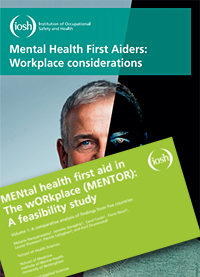The effectiveness of the introduction of Mental Health First Aiders into the workplace, is a relatively new phenomena initiated by the government in 2017.
Whilst the evidence of the limited research that has been done to date, concludes that MHFA's appeared to be a “useful vehicle” for raising awareness around mental health, much more work needs to be done in terms of research to conclude it has benefits in terms of being a preventative measure to what is continuing to be a rising workplace issue for employers and their workforce.
 We have known for years that workplace stress in the UK is far more problematic than in many European countries, and remains the number one issue for the TUC and individual Trade Unions and H&S organisations such as IOSH and the HSE.
We have known for years that workplace stress in the UK is far more problematic than in many European countries, and remains the number one issue for the TUC and individual Trade Unions and H&S organisations such as IOSH and the HSE.
IOSH (the Institution of Occupational Safety & Health), one of the UK’s leading Health and Safety Professional organisations has produced a report and guidance entitled ‘Mental Health First Aiders: Workplace Considerations’ which considers the adoption and implementation of Mental Health First Aid (MHFA) as an intervention and summarises some of its pros and cons for organisations and employers regarding the introduction of MHFA, from its recent IOSH funded research.
IOSH has produced a further two documents which deal with the research they contracted the University of Nottingham to conduct.
The IOSH research found that MHFA appeared to be a “useful vehicle” for raising awareness around mental health issues and HSE research last year also concluded that “There is consistent evidence that MHFA training raises employees’ awareness of mental ill-health conditions.”
Also, a Public Health England (PHE) and RAND Europe evaluation concluded that MHFA ranked highly in relation to evidence based interventions.
However, the research can be considered flawed or 'biased' say IOSH:
"The study has limitations that should be taken into account. Most notably, all data collected were from
UK-based organisations and individuals who had an interest in MHFA, and so the sample could be regarded as biased.
Moreover, the data was based on individual perspectives, as opposed to those of the organisations. In particular,
while survey respondents may have responded on behalf of their organisations, we cannot make the assumption that
this is what was actually done in the workplace. Finally, we were unable to recruit as many individuals who had
received MHFA in the workplace as we had wished; this would have provided further insights."
Research on workplace wellbeing interventions is still at an early stage however and MHFA England is working with the HSE and the Centre for Mental Health on the development of new research to further look into the impact of MHFA on the person trained and those they support in the workplace.
The key point and key conclusion of this IOSH Report is that appointing Mental Health First Aiders (MHFAs) must not be seen as the primary control for dealing with poor mental health in the workplace.
The founding principle of good occupational safety and health (OSH) practice is prevention. Employers taking preventative measures is a legal duty – to ensure the health, safety and welfare of the people they employ. Management systems and controls must be effective against workplace stressors and ill-treatment. Action must also be taken routinely to de-stigmatise mental ill-health throughout the organisation, promoting and supporting positive mental wellbeing.
All three documents can be downloaded from the Unionsafety E-Library using search word 'MHFA'
Source: IOSH / CWU LTB447/19